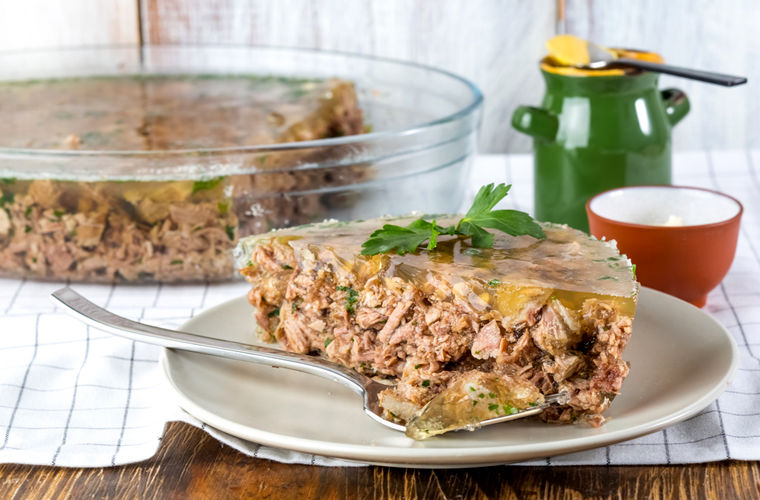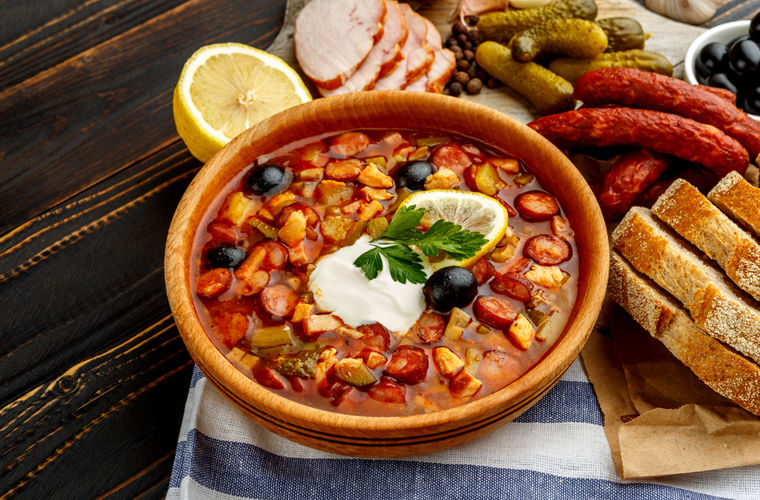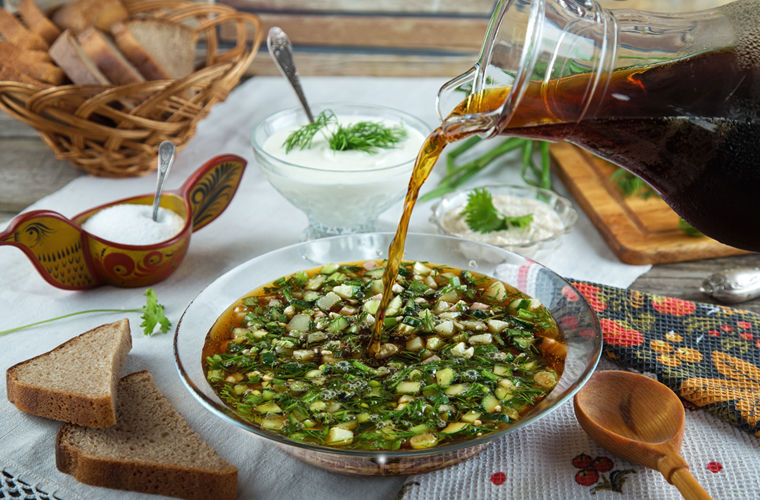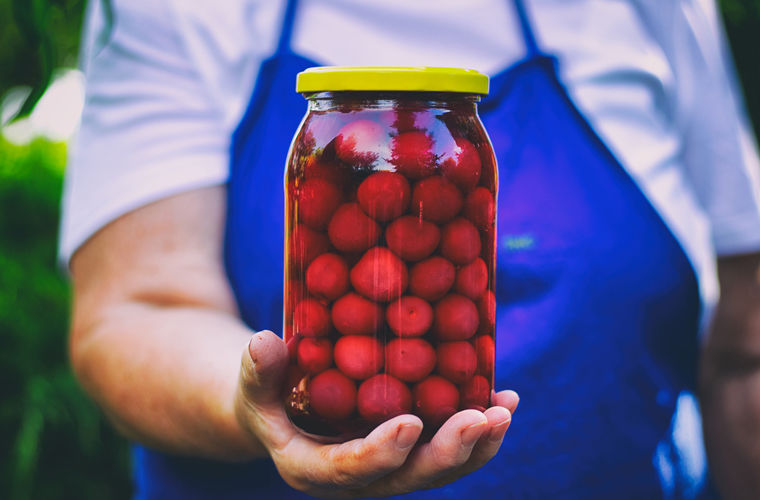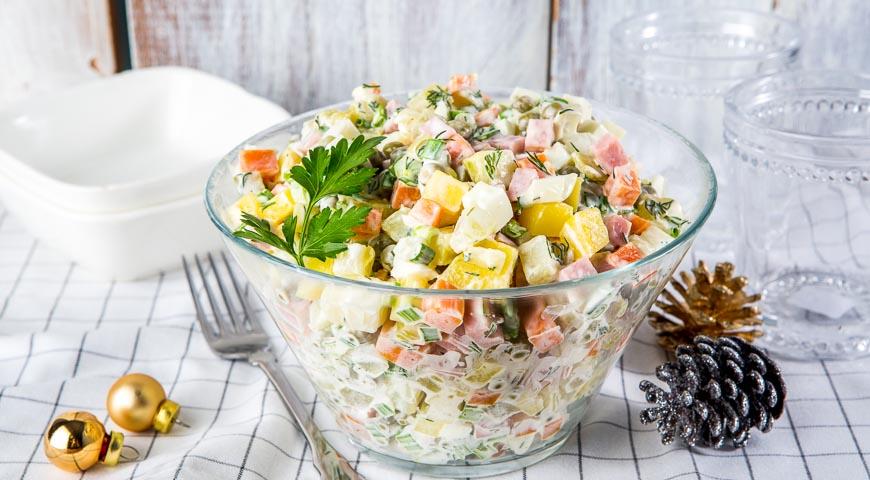Which Russian dessert is in the world top 25, do foreigners like aspic and what, according to a foreigner, is strange about Russian crepes? Let's talk about the most typical for Russian and atypical for guests from abroad Russian cuisine.
Kholodets (Aspic)
This dish traditionally has a lead in the "ugly contest of Russian dishes." Foreigners are quite frank: they do not understand why someone would make jelly unsweetened and cook it with meat. They are used to the fact that jelly is a dessert! If you mention that hoofs and ears are used as ingredients of the dish, which is questionable enough just the way it looks, you will face hard if not impossible task to convince a foreign guest that the aspic is delicious.
“When I saw it for the first time (I was visiting someone and the host was hardly known to me, so I could not refuse), I thought I was going to die. I do love all kind of fats and oils, but that scary thing looked really disgusting. Then it became clear to me that a lot of things depend on who cooks the aspic. I am able to eat it. However I have not come to fancy aspic and eat the dish just to be polite,”- wrote Katerina Corbella, a foreign user of The Question.
Hot Soups
Another specialty of Russian cuisine, which foreigners are often baffled with, is abundance of soups. It seems fair to say that a soup is pretty much everyday food for Russians all the year round. The Russians believe that soups are even more healthy for children. According to Tim Kerby, who has been living in Russia for several years, soup is a quite normal dish for foreigners, but they eat it in other countries much less often.
Foreigners’ reaction to borsch is quite ambiguous - some call it a disgusting hot and watery beetroot salad and some like it.
Cream-soups or light and clear vegetable soups are usually cooked in many European countries. “What you mean by “the first course” does not have the same meaning for us,” – explains Audrey Simon, a French woman. “Any soup must be in form of puree, and there is no another way to make it. For example, in summer Spanish gazpacho soup is very popular in France. We also love bread and garlic, so we add little crackers to the soup. But even such puree we eat before the main course and not instead of it!”
Rich Russian soups are similar to Hungarian, Scottish and Korean ones - in these countries you can go with one dish only, and it is served hot all year round.
Okroshka Cold Soup
Foreigners’ countenance changes as soon as they hear ”kvass” (name of a drink made from fermented rye bread). But seeing vegetables and pieces of sausage in it, they feel the day to recompense their sins has come. They cannot figure out why someone would pour a beverage over a salad, all the more – when such beverage is sour water. Some people are kind of ready to taste okroshka made with kefir (traditional fermented dairy drink) and mineral water; however not all stomachs would fancy it.
“Once one friend of mine (from Canada) gave okroshka the right definition: "They took all the things they’ve got on the table, including beverages, and put everything in one bowl.” Poor food, poor kvas, and even poor kefir. Who needs all those sufferings?” wrote one foreign user of The Question.
Shashlik
Although it is not an original Russian traditional dish, many foreigners consider it as such. Most people agree that meat the master of Russian cuisine. It is associated with Russia because of cold weather. They say a person needs a lot of strength to survive the Russian winter. And where can such strength be found? In meat. Shashlik is a quite appealing dish for nearly each and every one.
Artem Mishkin, a student of European University Cyprus, has lived on the island for some years now. Therefore he has already tried to treat friends with Russian dishes and noticed: “Cypriots love meat very much: lamb and beef can be found everywhere, and they are cooked in various ways. So it is no wonder that they like all Russian dishes with meat, especially shashlik. But it doesn’t really matter how much the locals love it: due to intense heat on the island you do not really feel like eating it. But once in Russia, any Cypriot will hoover it up before the host bats an eyelash!”
Syrniki (cottage-cheese pancakes)
Russian syrniki were included in the top 25 desserts of the world made by the Business Insider, one of the world's leading news portals. Some foreigners do not grip an idea of frying cottage cheese at first; however after tasting it, they get fascinated. Some foreigners do not grip an idea of frying cottage cheese at first; however after tasting it, they get fascinated.
Javier Garcia from Spain visited Russia several times: “I always liked Russian soups and pelmeni (stuffed dumplings). But once I realized that I did not know anything about Russian cuisine. My friend said that Russians eat syrniki for breakfast. I liked this dish so much that I even learned how to cook it and now for breakfast I eat only syrniki.”
Crepes
Crepes is a very popular dish too. However foreigners consider them to be a desert which shall be served with jam, marmalade or syrup. Crepes with meat, caviar, fish or any other rich filling seem to be rather weird in their opinion.
“When I first came to St. Petersburg, I was invited to a cafe to eat some crepes. There I saw that they put caviar and fish on crepes and they wrapped meat with them. I thought then: "My goodness, people, you need to put jam, butter or chocolate on them," but I decided to be polite and try crepes with meat. Now it is my favorite dish. In last four years I ate sweet crepes only once,” says James Brankin from Scotland.
Fruit Compot
In fact, this drink is widely known in European countries as fruit punch. Europeans just wonder why it needs boiling since then the cooking process becomes complicated. Asians have more difficulties with it as they do not have any drink similar to compot.
“Once Indian schoolchildren came to us through exchange program,” says Irina Trefilova, a teacher of English at the Lyceum in the village of Dolgorukovo, Lipetsk Region. “Our cooks were surprised that the Indians did not drink tea at all. Then we decided to treat them with compot, and one of the Russian pupils said in a joke that it was made with meat. For a long time we could not understand why none of the guests wanted to drink it. When the reason became clear, they laughed for a long time. I had to explain that compot is just boiled water, with added fruit and sugar.”
Olivier Salad
This salad is a must at each and every New Year celebration in Russia. However foreigners have kind of cautious attitude to it. Nearly minced vegetables covered with mayonnaise have nothing to do with European salads! Foreigners call it “Salad a la Russe” or “Russian salad”. But then again – many of them eat it...
“Spanish people have controversial feelings about Russian cuisine, but everyone likes Russian salad. However they put tuna instead of chicken or sausage,” says Natalia Golubar, a postgraduate student of the Autonomous University of Barcelona. “Some time ago I shared a rented apartment with a girl from Venezuela. So they have a similar salad as well, but it has to be always cooked with chicken. Perhaps this is the only thing that our cuisines have in common.”
“In Greece, salad is made with fresh vegetables, and in Russia it is something with mayonnaise that can be stored for a week. Russian salad in Greece is a disgusting dish, but here such salad is very tasty. Probably the Greeks imitate something in a wrong way,” believes Stratos Siurdakis from Greece.


